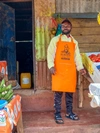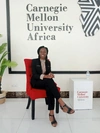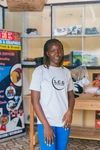Erick Niyonzima
Erick's Inspiring Journey: Building a Thriving Grocery Business

“I ran for my life. But when I arrived in Kenya, I chose to live.” – Erick Niyonzima
When 27-year-old Erick Niyonzima left Burundi in 2020, he didn’t have a blueprint for survival—he had fear, a little hope, and an urgent need to find safety.
“I come from a polygamous family,” Erick shares, “and things were not easy at home. There was hostility... especially from my stepmother. I feared for my life.”
Faced with growing threats at home, Erick made a decision no young person should ever have to make—he fled. Traveling alone through Tanzania, he crossed into Kenya and arrived in Nairobi with little more than the clothes on his back.
“In the beginning, I stayed with a friend—he’s also Burundian. He hosted me for six months. That support meant everything,” Erick recalls.
During those months, he and his friend walked five kilometers daily to the Westlands area to find work at construction sites for sh. 500 a day. After transport and lunch, Erick was left with about sh. 250, but he saved what he could.
“I used to ask myself, ‘What if I don’t get another work opportunity tomorrow?’ That thought pushed me to save.” Erick says.
Eventually, Erick was able to put aside sh. 5,000—enough to start a modest green grocery kiosk in Kangemi. Tomatoes, onions, and omena lined his small wooden shelves.

“My routine was tight. I’d work construction during the day, then rush back to attend to my kiosk from 5 p.m. I didn’t rest much, but I was proud of what I was building.”
Changes in Kenya’s Refugees’ Policies
Kenya’s Refugee Act of 2021 opened doors previously shut to refugees, allowing freedom of movement, access to work, and the chance to start businesses. For Erick, it meant he didn’t have to choose between survival and dignity.
Through SHOFCO’s Youth Voice and Empowerment (YVE) project, supported by the Mastercard Foundation, Erick gained access to critical training opportunities in entrepreneurship, savings, business management, and budgeting. He also participated in a comprehensive financial literacy training, which equipped him with practical skills to manage and grow his income. His commitment and drive earned him a spot among the 37 refugees who received a SHOFCO business grant—an opportunity that marked a turning point in his journey toward self-reliance.
“When I was selected for the grant, I was shocked—then overjoyed!” He says. “I used the funds to expand. More tomatoes, potatoes, and omena—and I bought a chips fryer and a warmer.”

Eric serving one of his regular customers at his Green Grocery Kiosk in Kangemi, Nairobi
These tools transformed his hustle. With improved hygiene and a new product line—freshly made French fries—Erick began attracting more customers and his profits doubled.
“Before, I’d make sh. 300 to 400 a day. Now, I make between sh. 800 to 1,000. That’s over sh. 30,000 a month!”
Erick now is able to cover essential expenses such as rent and food, while also prioritizing savings. He contributes Ksh. 500 daily to a chama and Ksh. 300 monthly to the Imani Group–Kangemi, a local refugee-led savings group. Members of the group can access small loans at affordable interest rates of 10% per month, providing a crucial financial cushion when needed. In Kenya, as in many refugee-hosting countries, refugees often face significant barriers to accessing loan products from mainstream financial institutions.
Although Erick runs his business solo, he remains committed to uplifting others in his community. “Occasionally, I get casual work that pays better,” he explains. “When that happens, I hire my neighbor—a young woman—to manage the kiosk.”
Erick is a young man with ambitions that extend far beyond selling French fries and tomatoes. His vision is to build a sustainable business that not only supports his livelihood but also creates opportunities for other young people in his community.
“I want to open a general shop, maybe a doughnut bakery too. I want to employ other refugees and even locals. We’re all part of this community. Here in Kangemi, I feel like I belong.”
Despite the milestones achieved, Erick is still navigating significant hurdles. Without an alien card, he doesn’t feel secure traveling beyond Nairobi, limiting both his mobility and business prospects. He is also eager to join the SHOFCO SACCO to access larger loans for business expansion, but with only his UNHCR registration, his access to financial services remains restricted to organizations like SHOFCO. This documentation gap continues to pose a challenge to refugee access to finance.
Still, Erick has demonstrated a high level of resilience beyond the existing barriers! His eyes are fixed on the bigger picture–rebuilding his life and creating opportunities for other young people.
His journey is proof that with the right community support, refugees should not only survive, they can thrive like everyone else. They have the potential to contribute to our socioeconomic development, create jobs, and inspire hope. More importantly, Erick believes that running a business supersedes profit maximization. To him, a business should impact local people positively, and enable them to live with dignity.
“I’m not just here to make money,” he says. “I’m here to grow, and to help others grow too.”
Through our partnership with the Mastercard Foundation, SHOFCO has supported over 37 refugees like Erick with business grants. Refugees today need more than just shelter or humanitarian aid. They need support rebuilding their lives and inclusive policies that foster integration into local communities with sustainable economic opportunities that allow them to thrive. A second chance, when supported by the right ecosystem, can unlock the potential of individuals like Erick who are ready to contribute to the economy, create more opportunities, and lead.





